formerly eScholarship Editions


|
|
|
|
Your request for similar items found 20 book(s). | Modify Search | Displaying 1 - 20 of 20 book(s) | |
| 1. | 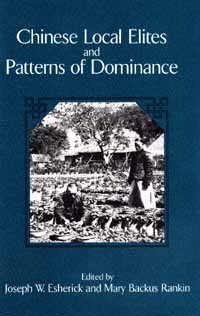 | Title: Chinese local elites and patterns of dominance Author: Esherick, Joseph Published: University of California Press, 1990 Subjects: History | China Publisher's Description: This important volume affords a panoramic view of local elites during the dramatic changes of late imperial and Republic China. Eleven specialists present fresh, detailed studies of subjects ranging from cultivated upper gentry to twentieth-century militarists, from wealthy urban merchants to village leaders. In the introduction and conclusion the editors reassess the pioneering gentry studies of the 1960s, draw comparisons to elites in Europe, and suggest new ways of looking at the top people in Chinese local social systems. Chinese Local Elites and Patterns of Dominance lays the foundation for future discussions of Chinese elites and provides a solid introduction for non-specialists.Essays are by Stephen C. Averill, Lenore Barkan, Lynda S. Bell, Timothy Brook, Prasenjit Duara, Edward A. McCord, William T. Rowe, Keith Schoppa, David Strand, Rubie S. Watson, and Madeleine Zelin. [brief] Similar Items |
| 2. | 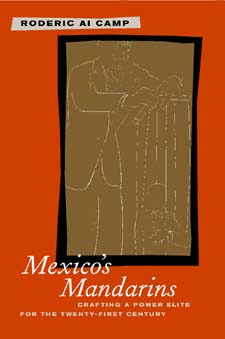 | Title: Mexico's mandarins: crafting a power elite for the twenty-first century Author: Camp, Roderic Ai Published: University of California Press, 2002 Subjects: Politics | Latin American Studies Publisher's Description: This groundbreaking study marks the culmination of over twenty years of research by one of this country's most prominent Mexico scholars. Roderic Ai Camp provides a detailed, comprehensive examination of Mexico's power elite - their political power, societal influence, and the crucial yet often overlooked role mentoring plays in their rise to the top. In the course of this book, he traces the careers of approximately four hundred of the country's most notable politicians, military officers, clergy, intellectuals, and capitalists. Thoroughly researched and drawn from in-depth interviews with some of Mexico's most powerful players, Mexico's Mandarins provides insight into the machinations of Mexican leadership and an important glimpse into the country's future as it steps onto the global stage. [brief] Similar Items |
| 3. | 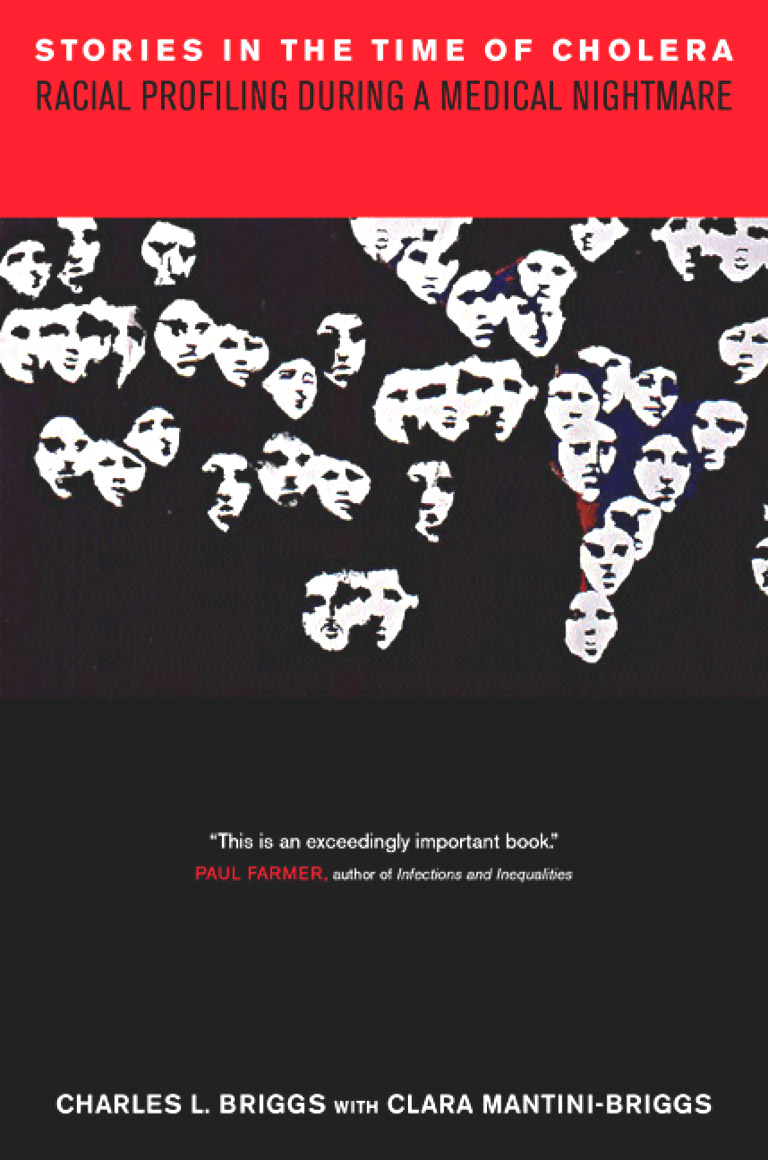 | Title: Stories in the time of cholera: racial profiling during a medical nightmare Author: Briggs, Charles L 1953- Published: University of California Press, 2003 Subjects: Anthropology | Latin American Studies | Ethnic Studies | Disease | Medical Anthropology Publisher's Description: Cholera, although it can kill an adult through dehydration in half a day, is easily treated. Yet in 1992-93, some five hundred people died from cholera in the Orinoco Delta of eastern Venezuela. In some communities, a third of the adults died in a single night, as anthropologist Charles Briggs and Clara Mantini-Briggs, a Venezuelan public health physician, reveal in their frontline report. Why, they ask in this moving and thought-provoking account, did so many die near the end of the twentieth century from a bacterial infection associated with the premodern past? It was evident that the number of deaths resulted not only from inadequacies in medical services but also from the failure of public health officials to inform residents that cholera was likely to arrive. Less evident were the ways that scientists, officials, and politicians connected representations of infectious diseases with images of social inequality. In Venezuela, cholera was racialized as officials used anthropological notions of "culture" in deflecting blame away from their institutions and onto the victims themselves. The disease, the space of the Orinoco Delta, and the "indigenous ethnic group" who suffered cholera all came to seem somehow synonymous. One of the major threats to people's health worldwide is this deadly cycle of passing the blame. Carefully documenting how stigma, stories, and statistics circulate across borders, this first-rate ethnography demonstrates that the process undermines all the efforts of physicians and public health officials and at the same time contributes catastrophically to epidemics not only of cholera but also of tuberculosis, malaria, AIDS, and other killers. The authors have harnessed their own outrage over what took place during the epidemic and its aftermath in order to make clear the political and human stakes involved in the circulation of narratives, resources, and germs. [brief] Similar Items |
| 4. |  | Title: China's new business elite: the political consequences of economic reform Author: Pearson, Margaret M 1959- Published: University of California Press, 1997 Subjects: Politics | Economics and Business | China Publisher's Description: The transition from a planned to a market economy that began in China in the late 1970s unleashed an extraordinary series of changes, including increases in private enterprise, foreign investment, the standard of living, and corruption. Another result of economic reform has been the creation of a new class - China's new business elite. Margaret M. Pearson considers the impact that this new class is having on China's politics. She concludes that, contrary to the assumptions of Westerners, these groups are not at the forefront of the emergence of a civil society; rather, they are part of a system shaped deliberately by the Chinese state to ensure that economic development will not lead to democratization. [brief] Similar Items |
| 5. |  | Title: Japan's administrative elite Author: Koh, Byung Chol Published: University of California Press, 1991 Subjects: Asian Studies | Japan | Economics and Business Publisher's Description: A major player in Japanese society is its government bureaucracy. Neither Japan's phenomenal track record in the world marketplace nor its remarkable success in managing its domestic affairs can be understood without insight into how its government bureaucracy works - how its elite administrators are recruited, socialized, and promoted; how they interact among themselves and with other principal players in Japan, notably politicians; how they are rewarded; and what happens to them when they retire at a relatively young age. Yet, despite its pivotal importance, there is no comprehensive and up-to-date study of Japan's administrative elite in the English language. This book seeks to fill that gap.Koh examines patterns of continuity and change, identifies similarities and differences between Japan and four other industrialized democracies (the United States, Britain, France, and Germany), and assesses the implications of the Japanese model of public management. Though many features of Japanese bureaucracy are found in the Western democracies, the degree to which they manifest themselves in Japan appears to be unsurpassed.Koh shows that the Japanese model of public management contains both strengths and weaknesses. For example, the price Japan pays for the high caliber of its administrative elite is the stifling rigidity of a multiple track system, a system with second-class citizens and demoralized "non-career" civil servants who actually bear a lion's share of administrative burden. The Japanese experience demonstrates not only how steep the price of success can be but also the enduring effects of culture over structure. [brief] Similar Items |
| 6. | 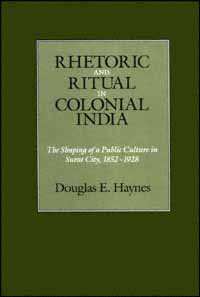 | Title: Rhetoric and ritual in colonial India: the shaping of a public culture in Surat City, 1852-1928 Author: Haynes, Douglas E Published: University of California Press, 1991 Subjects: History | Asian History | South Asia | Cultural Anthropology Publisher's Description: This book explores the rhetoric and ritual of Indian elites undercolonialism, focusing on the city of Surat in the Bombay Presidency. It particularly examines how local elites appropriated and modified the liberal representative discourse of Britain and thus fashioned a "public' culture that excluded the city's underclasses. Departing from traditional explanations that have seen this process as resulting from English education or radical transformations in society, Haynes emphasizes the importance of the unequal power relationship between the British and those Indians who struggled for political influence and justice within the colonial framework. A major contribution of the book is Haynes' analysis of the emergence and ultimate failure of Ghandian cultural meanings in Indian politics after 1923.The book addresses issues of importance to historians and anthropologists of India, to political scientists seeking to understand the origins of democracy in the "Third World," and general readers interested in comprehending processes of cultural change in colonial contexts. [brief] Similar Items |
| 7. | 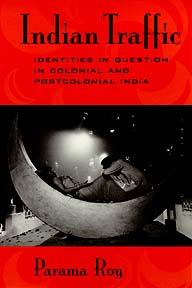 | Title: Indian traffic: identities in question in colonial and postcolonial India Author: Roy, Parama Published: University of California Press, 1998 Subjects: Postcolonial Studies | Literary Theory and Criticism | South Asia | Gender Studies Publisher's Description: The continual, unpredictable, and often violent "traffic" between identities in colonial and postcolonial India is the focus of Parama Roy's stimulating and original book. Mimicry has been commonly recognized as an important colonial model of bourgeois/elite subject formation, and Roy examines its place in the exchanges between South Asian and British, Hindu and Muslim, female and male, and subaltern and elite actors. Roy draws on a variety of sources - religious texts, novels, travelogues, colonial archival documents, and films - making her book genuinely interdisciplinary. She explores the ways in which questions of originality and impersonation function, not just for "western" or "westernized" subjects, but across a range of identities. For example, Roy considers the Englishman's fascination with "going native," an Irishwoman's assumption of Hindu feminine celibacy, Gandhi's impersonation of femininity, and a Muslim actress's emulation of a Hindu/Indian mother goddess. Familiar works by Richard Burton and Kipling are given fresh treatment, as are topics such as the "muscular Hinduism" of Swami Vivekananda. Indian Traffic demonstrates that questions of originality and impersonation are in the forefront of both the colonial and the nationalist discourses of South Asia and are central to the conceptual identity of South Asian postcolonial theory itself. [brief] Similar Items |
| 8. | 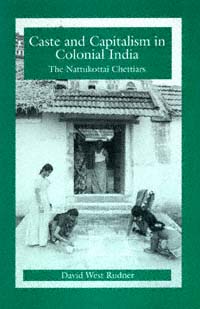 | Title: Caste and capitalism in colonial India: the Nattukottai Chettiars Author: Rudner, David West Published: University of California Press, 1994 Subjects: Anthropology | Cultural Anthropology | South Asia | Asian History Publisher's Description: David Rudner's richly detailed ethnographic and historical analysis of a South Indian merchant-banking caste provides the first comprehensive analysis of the interdependence among Indian business practice, social organization, and religion. Exploring noncapitalist economic formations and the impact of colonial rule on indigenous commercial systems, Rudner argues that caste and commerce are inextricably linked through formal and informal institutions. The practices crucial to the formation and distribution of capital are also a part of this linkage. Rudner challenges the widely held assumptions that all castes are organized either by marriage alliance or status hierarchy and that caste structures are incompatible with the "rational" conduct of business. [brief] Similar Items |
| 9. | 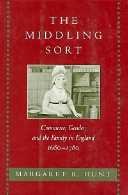 | Title: The middling sort: commerce, gender, and the family in England, 1680-1780 Author: Hunt, Margaret R 1953- Published: University of California Press, 1996 Subjects: History | Gender Studies | Social Science Publisher's Description: To be one of "the middling sort" in urban England in the late seventeenth or eighteenth century was to live a life tied, one way or another, to the world of commerce. In a lively study that combines narrative and alternately poignant and hilarious anecdotes with convincing analysis, Margaret R. Hunt offers a view of middling society during the hundred years that separated the Glorious Revolution from the factory age. Thanks to her exploration of many family papers and court records, Hunt is able to examine what people thought, felt, and valued. She finds that early capitalism and early modern family life were far more insecure than their "classical" models supposed.Commercial needs and social needs coincided to a large extent. The family is central to Hunt's story, and she shows how financial struggles brought conflict, ambiguity, and tension to the home. She investigates the way gender intertwined with class and family hierarchy and the way many businesses survived as precarious successes, secured through the sacrifices made by female as well as male family members. The Middling Sort offers a dynamic portrait of a society struggling to minimize the considerable social and psychic dislocation that accompanied England's launch of a full-scale market economy. [brief] Similar Items |
| 10. | 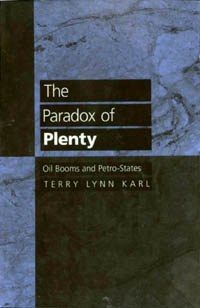 | Title: The paradox of plenty: oil booms and petro-states Author: Karl, Terry Lynn 1947- Published: University of California Press, 1997 Subjects: Politics | Economics and Business | Latin American Studies Publisher's Description: The Paradox of Plenty explains why, in the midst of two massive oil booms in the 1970s, oil-exporting governments as different as Venezuela, Iran, Nigeria, Algeria, and Indonesia chose common development paths and suffered similarly disappointing outcomes. Meticulously documented and theoretically innovative, this book illuminates the manifold factors - economic, political, and social - that determine the nature of the oil state, from the coherence of public bureaucracies, to the degree of centralization, to patterns of policy-making. Karl contends that oil countries, while seemingly disparate, are characterized by similar social classes and patterns of collective action. In these countries, dependence on petroleum leads to disproportionate fiscal reliance on petrodollars and public spending, at the expense of statecraft. Oil booms, which create the illusion of prosperity and development, actually destabilize regimes by reinforcing oil-based interests and further weakening state capacity.Karl's incisive investigation unites structural and choice-based approaches by illuminating how decisions of policymakers are embedded in institutions interacting with domestic and international markets. This approach - which Karl dubs "structured contingency" - uses a state's leading sector as the starting point for identifying a range of decision-making choices, and ends by examining the dynamics of the state itself. [brief] Similar Items |
| 11. | 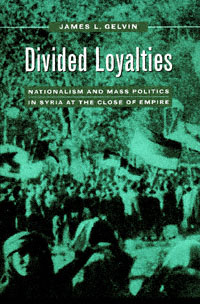 | Title: Divided loyalties: nationalism and mass politics in Syria at the close of Empire Author: Gelvin, James L 1951- Published: University of California Press, 1999 Subjects: History | Middle Eastern Studies | Middle Eastern History | Politics Publisher's Description: James L. Gelvin brings a new and distinctive perspective to the perennially fascinating topic of nationalism in the Arab Middle East. Unlike previous historians who have focused on the activities and ideas of a small group of elites, Gelvin details the role played by non-elites in nationalist politics during the early part of the twentieth century. Drawing from previously untapped sources, he documents the appearance of a new form of political organization - the popular committee - that sprang up in cities and villages throughout greater Syria in the immediate aftermath of the First World War. These committees empowered a new type of nationalist leadership, made nationalist politics a mass phenomenon for the first time, and articulated a view of nation and nationalism that continues to inform the politics of the region today.Gelvin does more than recount an episode in the history of nationalism in the Arab Middle East. His examination of leaflets, graffiti, speeches, rumors, and editorials offers fresh insights into the symbolic construction of national communities. His analysis of ceremonies - national celebrations, demonstrations, theater - contributes to our understanding of the emergence of mass politics. By situating his study within a broader historical context, Gelvin has written a book that will be of interest to all who wish to understand nationalism in the region and beyond. [brief] Similar Items |
| 12. | 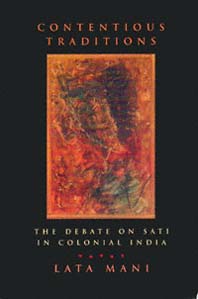 | Title: Contentious traditions: the debate on Sati in colonial India Author: Mani, Lata 1956- Published: University of California Press, 1998 Subjects: History | South Asia | Postcolonial Studies Publisher's Description: Contentious Traditions analyzes the debate on sati , or widow burning, in colonial India. Though the prohibition of widow burning in 1829 was heralded as a key step forward for women's emancipation in modern India, Lata Mani argues that the women who were burned were marginal to the debate and that the controversy was over definitions of Hindu tradition, the place of ritual in religious worship, the civilizing missions of colonialism and evangelism, and the proper role of the colonial state. Mani radically revises colonialist as well as nationalist historiography on the social reform of women's status in the colonial period and clarifies the complex and contradictory character of missionary writings on India.The history of widow burning is one of paradox. While the chief players in the debate argued over the religious basis of sati and the fine points of scriptural interpretation, the testimonials of women at the funeral pyres consistently addressed the material hardships and societal expectations attached to widowhood. And although historiography has traditionally emphasized the colonial horror of sati , a fascinated ambivalence toward the practice suffused official discussions. The debate normalized the violence of sati and supported the misconception that it was a voluntary act of wifely devotion.Mani brilliantly illustrates how situated feminism and discourse analysis compel a rewriting of history, thus destabilizing the ways we are accustomed to look at women and men, at "tradition," custom, and modernity. [brief] Similar Items |
| 13. | 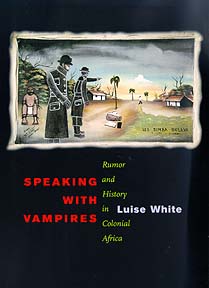 | Title: Speaking with vampires: rumor and history in colonial Africa Author: White, Luise Published: University of California Press, 2000 Subjects: African Studies | African History | African Studies | Cultural Anthropology Publisher's Description: During the colonial period, Africans told each other terrifying rumors that Africans who worked for white colonists captured unwary residents and took their blood. In colonial Tanganyika, for example, Africans were said to be captured by these agents of colonialism and hung upside down, their throats cut so their blood drained into huge buckets. In Kampala, the police were said to abduct Africans and keep them in pits, where their blood was sucked. Luise White presents and interprets vampire stories from East and Central Africa as a way of understanding the world as the storytellers did. Using gossip and rumor as historical sources in their own right, she assesses the place of such evidence, oral and written, in historical reconstruction. White conducted more than 130 interviews for this book and did research in Kenya, Uganda, and Zambia. In addition to presenting powerful, vivid stories that Africans told to describe colonial power, the book presents an original epistemological inquiry into the nature of historical truth and memory, and into their relationship to the writing of history. [brief] Similar Items |
| 14. |  | Title: Urban forms and colonial confrontations: Algiers under French rule Author: Çelik, Zeynep Published: University of California Press, 1997 Subjects: Architecture | Middle Eastern Studies | Middle Eastern History | French Studies | Postcolonial Studies Publisher's Description: During its long history as the French colonial city par excellence , Algiers was the site of recurrent conflicts between colonizer and colonized. Through architecture and urban forms confrontations were crystallized, cultural identities were defined, and social engineering programs were shaped and challenged. In this pathbreaking book, Zeynep Çelik reads the city of Algiers as the site of social, political, and cultural conflicts during the 132 years of French occupation and argues that architecture and urban forms are integral components of the colonial discourse.Algiers' city planning, based on what Çelik calls "the trial-and-error" model of French colonial urbanism, included the fragmentation of the casbah, ambitious Beaux Arts schemes to create European forms of housing, master plans inspired by high modernism, and comprehensive regional plans. Eventually a dramatic housing shortage led all planning efforts to be centered on the construction of large-scale residential enclaves. French architects based their designs for domestic space on the concept of the "traditional house," itself an interdisciplinary colonial concept intertwined with the discourse on Algerian women. Housing also offered the French colonizers a powerful presence in a country where periodic resistance to the occupation eventually culminated in a seven-year war of liberation and an end to French rule.Extensively illustrated with photographs, maps, and housing plans, Çelik's book presents a fascinating example of colonial urban planning. Algiers comes alive as a city that reflected all the conflicts of colonialism while embracing innovation. [brief] Similar Items |
| 15. | 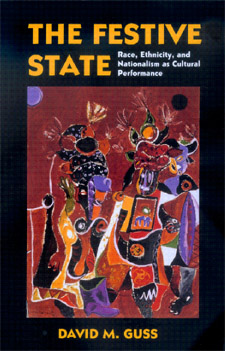 | Title: The festive state: race, ethnicity, and nationalism as cultural performance Author: Guss, David M Published: University of California Press, 2001 Subjects: Anthropology | Latin American Studies | Ethnic Studies | Cultural Anthropology | Sociology | Popular Culture Publisher's Description: If, as David Guss argues, culture is a contested terrain with constantly changing contours, then festivals are its battlegrounds, where people come to fight and dispute in large acts of public display. Festive behavior, long seen by anthropologists and folklorists as the "uniform expression of a collective consciousness, is contentious and often subversive," and The Festive State is an eye-opening guide to its workings. Guss investigates "the ideology of tradition," combining four case studies in a radical multisite ethnography to demonstrate how in each instance concepts of race, ethnicity, history, gender, and nationhood are challenged and redefined. In a narrative as colorful as the events themselves, Guss presents the Afro-Venezuelan celebration of San Juan, the "neo-Indian" Day of the Monkey, the mestizo ritual of Tamunangue, and the cultural policies and products of a British multinational tobacco corporation. All these illustrate the remarkable fluidity of festive behavior as well as its importance in articulating different cultural interests. [brief] Similar Items |
| 16. |  | Title: To weave and sing: art, symbol, and narrative in the South American rainforest Author: Guss, David M Published: University of California Press, 1990 Subjects: Anthropology | Cultural Anthropology | Art | Latin American Studies Publisher's Description: To Weave and Sing is the first in-depth analysis of the rich spiritual and artistic traditions of the Carib-speaking Yekuana Indians of Venezuela, who live in the dense rain forest of the upper Orinoco. Within their homeland of Ihuruna, the Yekuana have succeeded in maintaining the integrity and unity of their culture, resisting the devastating effects of acculturation that have befallen so many neighboring groups. Yet their success must be attributed to more than natural barriers of rapids and waterfalls, to more than lack of "contact" with our "modern" world. The ethnographic history recounted here includes not only the Spanish discovery of the Yekuana but detailed indigenous accounts of the entire history of Yekuana contact with Western culture, revealing an adaptive technique of mythopoesis by which the symbols of a new and hostile European ideology have been consistently defused through their incorporation into traditional indigenous structures.The author's initial point of departure is the Watunna , the Yekuana creation epic, but he finds his principal entrance into this mythic world through basketry, focusing on the eleborate kinetic designs of the round waja baskets and the stories told about them. Guss argues that the problem of understanding Yekuana basketry is the problem of understanding all traditional art forms within a tribal context, and critiques the cultural assumptions inherent in our systems of classification. He demonstrates that the symbols woven into the baskets function not in isolation but collectively, as a powerful system cutting across the entire culture. To Weave and Sing addresses all Yekuana material culture and the greater reality it both incorporates and masks, discerning a unifying configuration of symbols in chapters on architectural forms, the geography of the body, and the use of herbs, face paints, and chants. A narrow view of slash-and-burn gardens as places of mere subsistence is challenged by Guss's portrait of these exclusively female spaces as systematic inversions of the male world, "the sacred turned on its head." Throughout, a wealth of narrative and ritual materials provides us with the closest approximation we have to a native exegesis of these phenomena. What we are offered here is a new Poetics of Culture, ethnography not as a static given but as a series of shifting fields, wherein culture (and our image of it) is constantly recreated in all of its parts, by all of its members. [brief] Similar Items |
| 17. | 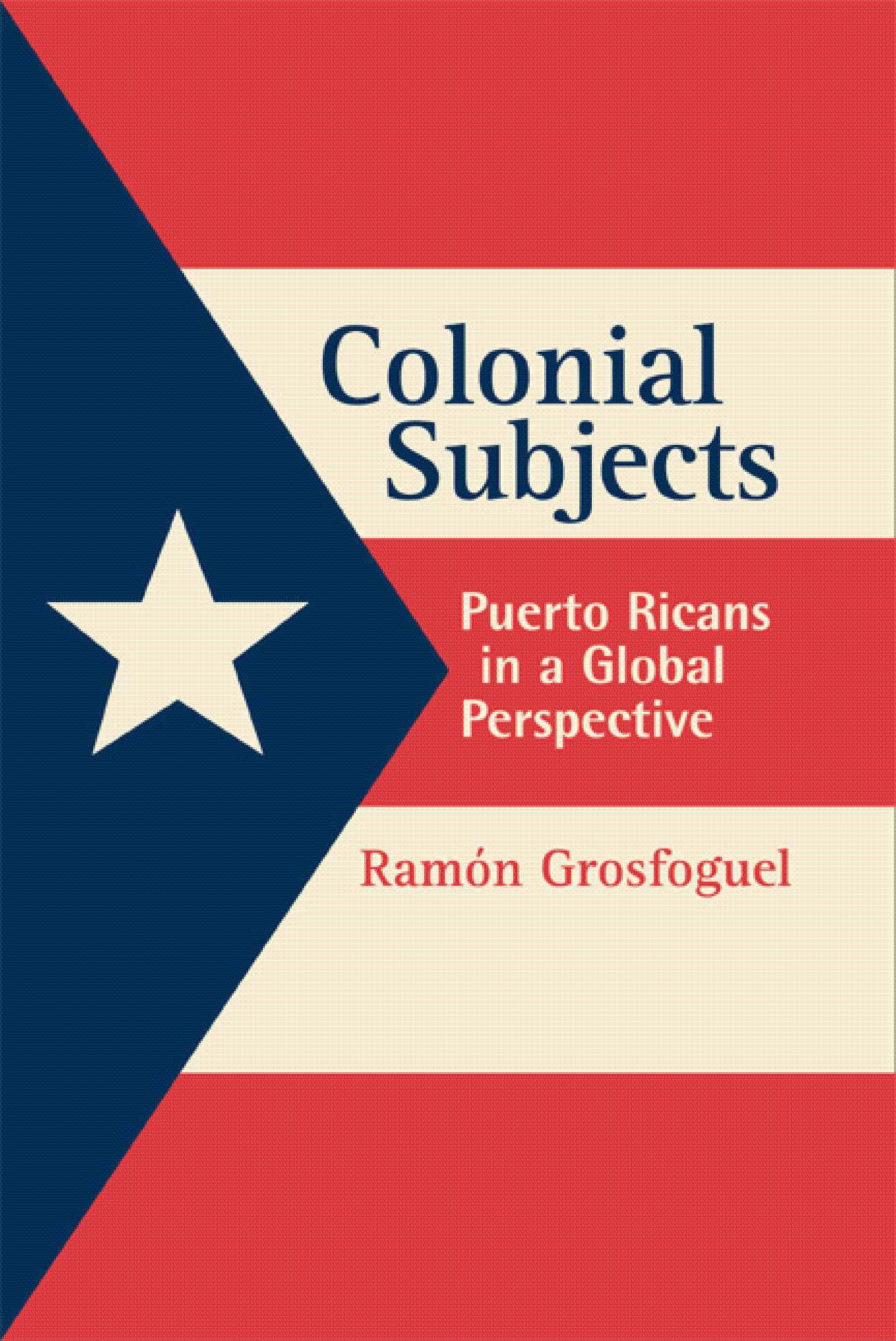 | Title: Colonial subjects: Puerto Ricans in a global perspective Author: Grosfoguel, Ramón Published: University of California Press, 2003 Subjects: Sociology | American Studies | Anthropology | Ethnic Studies | Latin American History | Postcolonial Studies | Urban Studies | Immigration | Urban Studies | Urban Studies Publisher's Description: Colonial Subjects is the first book to use a combination of world-system and postcolonial approaches to compare Puerto Rican migration with Caribbean migration to both the United States and Western Europe. Ramón Grosfoguel provides an alternative reading of the world-system approach to Puerto Rico's history, political economy, and urbanization processes. He offers a comprehensive and well-reasoned framework for understanding the position of Puerto Rico in the Caribbean, the position of Puerto Ricans in the United States, and the position of colonial migrants compared to noncolonial migrants in the world system. [brief] Similar Items |
| 18. | 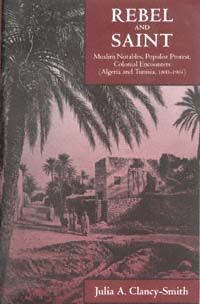 | Title: Rebel and saint: Muslim notables, populist protest, colonial encounters (Algeria and Tunisia, 1800-1904) Author: Clancy-Smith, Julia A Published: University of California Press, 1994 Subjects: History | Middle Eastern History | Postcolonial Studies | French Studies | African Studies Publisher's Description: Julia Clancy-Smith's unprecedented study brings us a remarkable view of North African history from the perspective of the North Africans themselves. Focusing on the religious beliefs and political actions of Muslim elites and their followers in Algeria and Tunisia, she provides a richly detailed analysis of resistance and accommodation to colonial rule.Clancy-Smith demonstrates the continuities between the eras of Turkish and French rule as well as the importance of regional ties among elite families in defining Saharan political cultures. She rejects the position that Algerians and Tunisians were invariably victims of western colonial aggression, arguing instead that Muslim notables understood the outside world and were quite capable of manipulating the massive changes occurring around them. [brief] Similar Items |
| 19. |  | Title: Imperial bedlam: institutions of madness in colonial southwest Nigeria Author: Sadowsky, Jonathan Hal Published: University of California Press, 1999 Subjects: African Studies | Psychology | African History | Medicine | Social Problems Publisher's Description: The colonial government of southern Nigeria began to use asylums to confine the allegedly insane in 1906. These asylums were administered by the British but confined Africans. Yet, as even many in the government recognized, insanity is a condition that shows cultural variation. Who decided the inmates were insane and how? This sophisticated historical study pursues these questions as it examines fascinating source material - writings by African patients in these institutions and the reports of officials, doctors, and others - to discuss the meaning of madness in Nigeria, the development of colonial psychiatry, and the connections between them. Jonathan Sadowsky's well-argued, concise study provides important new insights into the designation of madness across cultural and political frontiers. Imperial Bedlam follows the development of insane asylums from their origins in the nineteenth century to innovative treatment programs developed by Nigerian physicians during the transition to independence. Special attention is given to the writings of those considered "lunatics," a perspective relatively neglected in previous studies of psychiatric institutions in Africa and most other parts of the world. Imperial Bedlam shows how contradictions inherent in colonialism were articulated in both asylum policy and psychiatric theory. It argues that the processes of confinement, the labeling of insanity, and the symptoms of those so labeled reflected not only cultural difference but also political divides embedded in the colonial situation. Imperial Bedlam thus emphasizes not only the cultural background to madness but also its political and experiential dimensions. [brief] Similar Items |
| 20. | 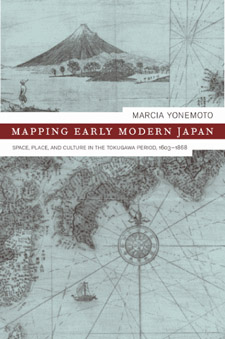 | Title: Mapping early modern Japan: space, place, and culture in the Tokugawa period, 1603-1868 Author: Yonemoto, Marcia 1964- Published: University of California Press, 2003 Subjects: History | Asian Studies | Geography | Japan Publisher's Description: This elegant history considers a fascinating array of texts, cultural practices, and intellectual processes - including maps and mapmaking, poetry, travel writing, popular fiction, and encyclopedias - to chart the emergence of a new geographical consciousness in early modern Japan. Marcia Yonemoto's wide-ranging history of ideas traces changing conceptions and representations of space by looking at the roles played by writers, artists, commercial publishers, and the Shogunal government in helping to fashion a new awareness of space and place in this period. Her impressively researched study shows how spatial and geographical knowledge confined to elites in early Japan became more generalized, flexible, and widespread in the Tokugawa period. In the broadest sense, her book grasps the elusive processes through which people came to name, to know, and to interpret their worlds in narrative and visual forms. [brief] Similar Items |